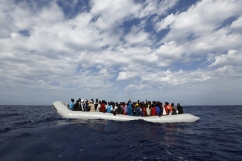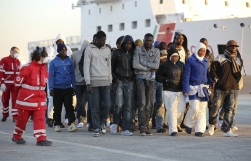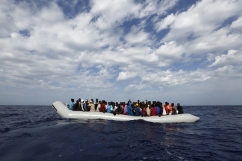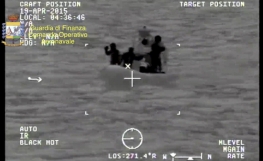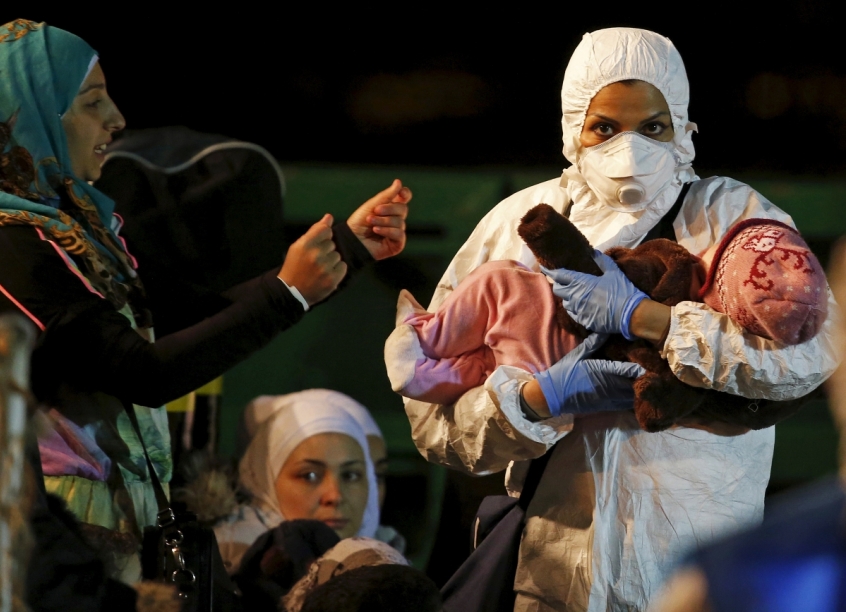
Up to 700 migrants died on Saturday night when their overcrowded boat overturned off the coast of Libya.
That makes around 1,600 migrant deaths in the Mediterranean so far this year, according to the office of the United Nations High Commissioner for Refugees (UNHCR). On the other hand, 13,500 have been rescued, and 35,000 made the crossing successfully. Last year 218,000 crossed and 3,500 died.
The figures are bad enough, just as numbers. But there's enough graphic footage out there of terrified people sinking and drowning just out of reach of their rescuers, and enough interviews with the bereaved and traumatised survivors, to rend the stoniest heart.
However, tears are not enough: the question is, what to do? Until last November, Italy ran a search and rescue operation set up in the wake of the 2013 Lampedusa migrant shipwreck, in which around 360 people drowned a quarter of a mile from the shore. Among them was a woman who had given birth and whose baby was still attached to her. An outpouring of horror led to the setting up of the Mare Nostrum operation, which cost £7 million a month.
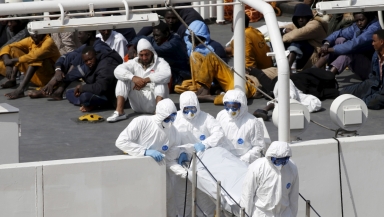
Mare Nostrum, however, was accused of becoming part of the problem rather than part of the solution, and a similar accusation can be made against its smaller-scale successor. According to hardliners, rescuing migrants plays into the hands of the network of traffickers who make fortunes from transporting them: they can send them to sea knowing that there is a fair chance they will be picked up. In the end, though Mare Nostrum saved around 100,000 lives last year, the Italian government decided that even more could be saved by ending it. It was replaced by a smaller (and cheaper) force operating only within 30 miles of the Italian coast.
So by this account, the altruism of Italians and – to a lesser extent – other Europeans ends up driving the problem it wants to solve. If migrants are picked up by dedicated rescue vessels, they will keep on coming. If they aren't, they will keep on dying.
And it really is a problem. The influx of migrants into Southern Europe – Italy and Malta in particular – is straining already over-stretched resources. In Greece it has contributed to the rise of the neo-fascist Golden Dawn party; in Italy the leader of the right-wing Northern League has said that migrants should be "helped", but left on their boats.
But where do they come from, and where do they go? They come from Eritrea, Ghana, Nigeria, Sudan, Chad, either making their own way through the chaos that Libya has become following the collapse of the Gaddafi regime or, more likely, being passed along an extensive network of people-traffickers. They are driven by fear of conflict and by a desire for something better: literally, they are running for their lives.

Thanks partly to the 'Dublin regulation' which says that the first European Union state where a migrant arrives is responsible for the claimant, Italy – along with Germany, Sweden, France and Britain – is one of the five EU countries that get 70 per cent of all asylum applications. But even traditionally hospitable countries like Germany and Sweden are struggling to keep their populations sympathetic. In Britain, the subject of immigration is generally toxic: we're desperately sorry for drowning migrants (Sun columnist Katie Hopkins faced a huge backlash when she described them as being 'like cockroaches' who should be turned back by helicopter gunships) but we don't want them here.
Aside from her deliberately provocative (and profoundly unpleasant) language, however, Hopkins was perhaps intending to make a serious point. She referred to Australia's policy of intercepting boats at sea and turning them round, and detaining asylum-seekers in island camps on Manus and Nauru, often in harsh conditions. The policy has been sweepingly criticised by UNHCR and human rights organisations as racist, heartless and draconian, but is popular in Australia.
The situation in Europe is different, however. There are more migrants, they have less distance to travel and it is far easier for the European media to cover sinkings. The Hopkins solution – machine-gunning boats to force them to turn back – would outrage public opinion, and the Twitter hashtag #restarttherescue (an Amnesty International campaign) is very popular. But the question doesn't go away: because of the almost inexhaustible supply of migrants and the number of traffickers prepared to make money out of their distress, simply restarting the rescue and making the whole process easier and safer is ultimately no solution.
So there are three problems facing policymakers, not just one. The first is what to do with the migrants who succeed in getting as far as Libya and attempt the crossing. It's clear that this cannot simply be left to the Southern Mediterranean countries alone, which carry a financial and social weight that they cannot be expected to endure forever. As the Archbishop of Canterbury said earlier today, "We can't say this is one country's responsibility, the one nearest, that's not right. This is nothing about the European Union, I'm talking about countries across the region, we need to share the burden."
So, as the general secretary of the Churches' Commission for Migrants in Europe, Doris Peschke, observed: "Only legal and safe pathways into Europe would help to prevent these tragedies from happening. This includes increased refugee resettlement and lifting of visa requirements for people arriving from countries in conflict, like Syria and Eritrea. We need safe passages." This means that countries resistant to immigration and reluctant to take asylum seekers, such as Britain, will need to examine their collective consciences and ask whether they are willing to take more asylum seekers themselves, or to fund those who will.
Second, there is a specific problem with Libya, and this has been created by the collapse of government in the country following the victory – aided by air strikes – of rebel forces over the government of Colonel Gaddafi. This was another example – Iraq is the primary case – of an intervention in support of a favoured group which was not backed up by any political vision or military commitment for its future. The unendurable sight of the forces of repression extinguishing the brave defenders of freedom – as the world's media vividly portrayed it – resulted in a half-hearted response that left a power vacuum which Islamists and criminals have rushed to fill. An expensive commitment to nation-building in Libya is required as a result; without it, all the search and research missions in the world won't stop the haemorrhage.
Third, there are multiple problems with the countries from which these migrants come. The migrants are fleeing war, hunger, oppression and disease. They know enough of life in Europe to know that it's better than anything they've left behind. But these are very often the ones who are the bravest and most resourceful: just the people their countries need if they're to flourish. There's no more point in stopping them after they've reached Libya than there is in picking them up half-way across the Mediterranean: there needs to be a huge and sophisticated programme aimed at deterring them from setting off in the first place.
And the best way of doing that is also the moral and Christian way: it means helping to make their countries desirable places to live, safe, healthy and prosperous. As Prime Minister David Cameron pointed out, "search and rescue is only one part. We need to go after traffickers, help stabilise these countries". That, too, is expensive – and it arguably reveals the hollowness of arguments against Britain devoting large sums to foreign aid, though it might indicate where it should best be spent.
Until then, as EU foreign policy chief Federica Mogherini said, there is "no magic solution". "We have a political and moral duty to exercise our role," she said. "The Mediterranean is our sea and we have to act together as Europeans. The European Union was built and is built around the protection of human rights, human dignity and the life of human people - we need to be consistent in that."
She's right: there is no magic solution. The scale of the problem is immense, demanding the sort of diplomatic, financial and possibly even military collaboration that will be very, very hard to achieve in today's climate. Without it, though, thousands more desperate human beings will drown. And even that, perhaps, is not the worst-case scenario. That would be the Hopkins solution: driving the migrant ships back, patrolling the Libyan coast to stop them setting sail, and leaving them to fester in huge and growing detention centres. But without a long-term, humane vision for the future, this is a frightening possibility.










